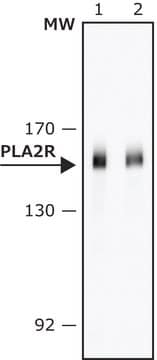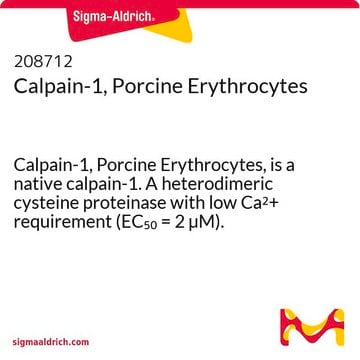MAB6020
Anti-Cytochrome P450 11β-Hydroxylase Antibody, clone 11B2-1A4
culture supernatant, clone 11B2-1A4, Chemicon®
About This Item
WB
western blot: suitable
Recommended Products
biological source
mouse
Quality Level
antibody form
culture supernatant
antibody product type
primary antibodies
clone
11B2-1A4, monoclonal
species reactivity
rat
manufacturer/tradename
Chemicon®
technique(s)
immunohistochemistry: suitable (paraffin)
western blot: suitable
isotype
IgG1
UniProt accession no.
shipped in
wet ice
target post-translational modification
unmodified
Gene Information
rat ... Cyp11B1(500892)
Specificity
Immunogen
Application
Metabolism
Enzymes & Biochemistry
Immunohistochemistry (S.T.F. on paraffin embedded tissue required, traditional formalin fixation or paraformaldehyde fixation is not recommended. Microwave or pressure cooker antigen retrieval; blocking with a solution of 0.5% SDS, 2% milk and 5% NGS in Tris-HCL pH 7.6. Primary antibody is diluted in PBS or TBS typically with no SDS or NGS: 1:50-200, usually overnight refrigerated. After washing 4X with Tris buffer pH 7.6, secondary goat anti-mouse secondary (AP124B) is incubated (1:500-1:2000) diluted in a solution of 2% milk, 5% NGS, Tris-HCL pH 7.6 and 0.05% tween 20. Detection is via streptavidin HRP/DAB. Recommended counter stain is Gill′s Haematoxylin.
Optimal working dilutions must be determined by end user.
STF fixative is available from streck laboratories, www.streck.com).
Physical form
Storage and Stability
Legal Information
Disclaimer
Not finding the right product?
Try our Product Selector Tool.
Storage Class Code
12 - Non Combustible Liquids
WGK
nwg
Flash Point(F)
Not applicable
Flash Point(C)
Not applicable
Certificates of Analysis (COA)
Search for Certificates of Analysis (COA) by entering the products Lot/Batch Number. Lot and Batch Numbers can be found on a product’s label following the words ‘Lot’ or ‘Batch’.
Already Own This Product?
Find documentation for the products that you have recently purchased in the Document Library.
Our team of scientists has experience in all areas of research including Life Science, Material Science, Chemical Synthesis, Chromatography, Analytical and many others.
Contact Technical Service








